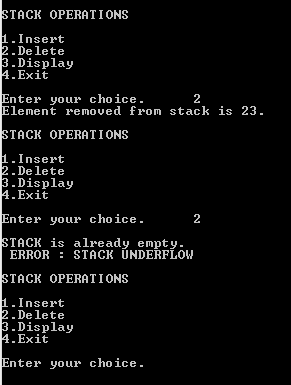In this post we will see some basic operations of stack like insertion , deletion . Generally a stack is a an abstract data type where insertion and deletion takes place at one end and that end is know as top. |
See the image below,
"Data stack" by User:Boivie - made in Inkscape, by myself User:Boivie. Based on Image:Stack-sv.png, originally uploaded to the Swedish Wikipedia in 2004 by sv:User:Shrimp. Licensed under Public Domain via Wikimedia Commons.
The principle of the stack is : Last In First Out (LIFO)
Here in this program we initially take top as -1 and when an element is inserted top is incremented and pushes the value in stack , similarly when when an element is deleted top is decremented and pops the value from stack.
There are two error conditions here :
- Stack Overflow
- Stack Underflow
Stack Underflow is a situation where the stack is empty and we are still trying to delete elements from that stack.
PROGRAM :
#include <stdio.h> #include <stdlib.h> #define MAX 10 void push(); int pop(); int top = -1; int stack[MAX]; int main() { int element,choice,d; while(1) { printf("\nSTACK OPERATIONS \n\n"); printf("1.Insert \n"); printf("2.Delete \n"); printf("3.Display \n"); printf("4.Exit\n\n"); printf("Enter your choice. \t"); scanf("%d",&choice); switch (choice) { case 1: if ( top == MAX - 1 ) printf("\nSTACK is already full. Delete some elements and try again ! \n ERROR : STACK OVERFLOW\n"); else { printf("\nEnter the value to insert.\t"); scanf("%d",&element); push(element); } break ; case 2: if ( top == -1 ) printf("\nSTACK is already empty. \n ERROR : STACK UNDERFLOW\n"); else { element = pop(); printf("Element removed from stack is %d.\n", element); } break; case 3: if ( top == -1 ) printf("\nSTACK is empty. Cannot display anything\n"); else { printf("There are %d elements in stack.\n", top+1); for ( d = top ; d >= 0 ; d-- ) printf("%d\n", stack[d]); printf("\n"); } break; case 4: exit(0); } } return 0; } void push(int value) { top++; stack[top] = value; } int pop() { int element; if ( top == -1 ) return top; element = stack[top]; top--; return element; }
OUTPUT :



